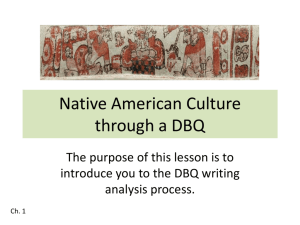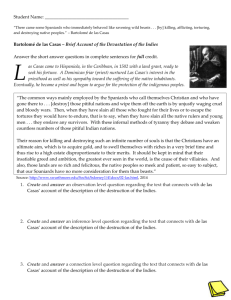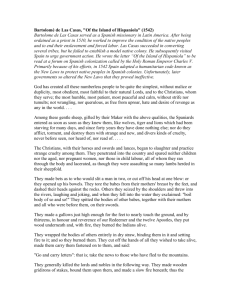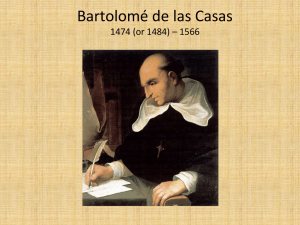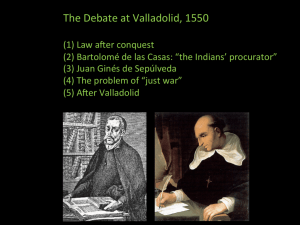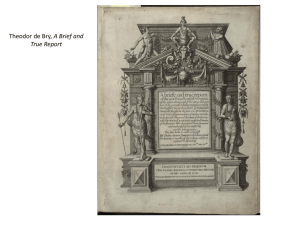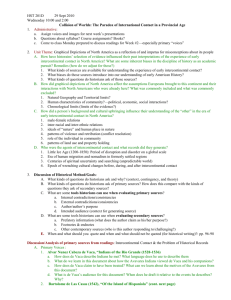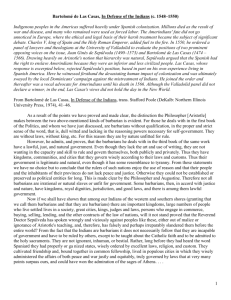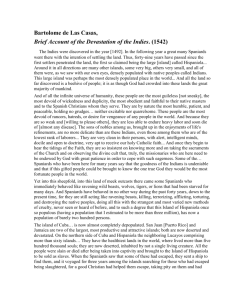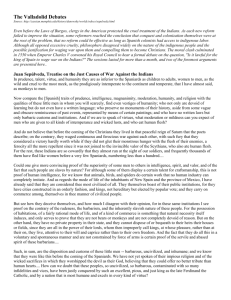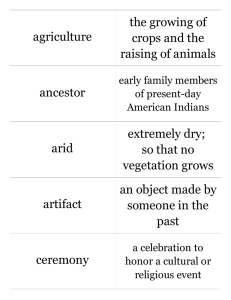Las Casas, Destruction of the Indies, 1542
advertisement
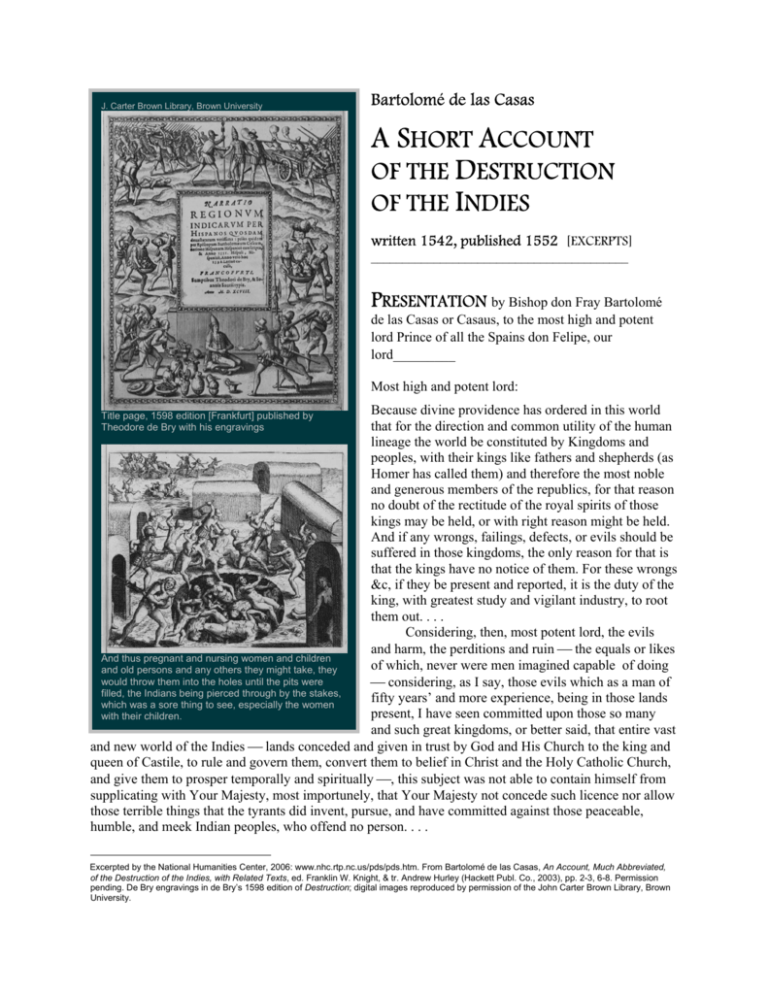
J. Carter Brown Library, Brown University Bartolomé de las Casas A SHORT ACCOUNT OF THE DESTRUCTION OF THE INDIES written 1542, published 1552* [EXCERPTS] _________________________________________ PRESENTATION by Bishop don Fray Bartolomé de las Casas or Casaus, to the most high and potent lord Prince of all the Spains don Felipe, our lord_________ Most high and potent lord: Because divine providence has ordered in this world that for the direction and common utility of the human lineage the world be constituted by Kingdoms and peoples, with their kings like fathers and shepherds (as Homer has called them) and therefore the most noble and generous members of the republics, for that reason no doubt of the rectitude of the royal spirits of those kings may be held, or with right reason might be held. And if any wrongs, failings, defects, or evils should be suffered in those kingdoms, the only reason for that is that the kings have no notice of them. For these wrongs &c, if they be present and reported, it is the duty of the king, with greatest study and vigilant industry, to root them out. . . . Considering, then, most potent lord, the evils and harm, the perditions and ruin the equals or likes And thus pregnant and nursing women and children of which, never were men imagined capable of doing and old persons and any others they might take, they would throw them into the holes until the pits were considering, as I say, those evils which as a man of filled, the Indians being pierced through by the stakes, fifty years’ and more experience, being in those lands which was a sore thing to see, especially the women present, I have seen committed upon those so many with their children. and such great kingdoms, or better said, that entire vast and new world of the Indies lands conceded and given in trust by God and His Church to the king and queen of Castile, to rule and govern them, convert them to belief in Christ and the Holy Catholic Church, and give them to prosper temporally and spiritually , this subject was not able to contain himself from supplicating with Your Majesty, most importunely, that Your Majesty not concede such licence nor allow those terrible things that the tyrants did invent, pursue, and have committed against those peaceable, humble, and meek Indian peoples, who offend no person. . . . Title page, 1598 edition [Frankfurt] published by Theodore de Bry with his engravings * Excerpted by the National Humanities Center, 2006: www.nhc.rtp.nc.us/pds/pds.htm. From Bartolomé de las Casas, An Account, Much Abbreviated, of the Destruction of the Indies, with Related Texts, ed. Franklin W. Knight, & tr. Andrew Hurley (Hackett Publ. Co., 2003), pp. 2-3, 6-8. Permission pending. De Bry engravings in de Bry’s 1598 edition of Destruction; digital images reproduced by permission of the John Carter Brown Library, Brown University. Univ. of Alabama Library [INTRODUCTION] . . . Into and among these gentle sheep, endowed by their Maker and Creator with all the qualities aforesaid, did creep the Spaniards, who no sooner had knowledge of these people than they became like fierce wolves and tigers and lions who have gone many days without food or nourishment. And no other thing have they done for forty years until this day,1 and still today see fit to do, but dismember, slay, perturb, afflict, torment, and destroy the Indians by all manner of cruelty new and divers and most singular manners such as never before seen or read of heard of some few of which shall be recounted below, and Ortelius, Americæ sive novi orbis, nova descriptio, Antwerp, 1570 they do this to such a degree that on the Island (details) of Hispaniola, of the above three millions souls that we once saw, today there be no more than two hundred of those native people remaining. The island of Cuba is almost as long as from Valladolid to Rome; today it is almost devoid of population. The island of San Juan [Puerto Rico] and that of Jamaica, large and wellfavoured and lovely islands both, have been laid waste. On the Isles of the Lucayos [Bahamas] . . . where there were once above five hundred thousand souls, today there is not a living creature. All were killed while being brought, and because of being brought, to the Island of Hispaniola where the Spaniards saw that their stock of the natives of that latter island had come to an end. . . . Two principal and general customs have been employed by those, calling themselves Christians, who have passed this way, in extirpating and striking from the face of the earth those suffering nations. The first being unjust, cruel, bloody, and tyrannical warfare. The other after having slain all those who might yearn toward or suspire after or think of freedom, or consider escaping from the torments that they are made to suffer, by which I mean all the native-born lords and adult males, for it is the Spaniards’ custom in their wars to allow only young boys and females to live being to oppress them with the hardest, harshest, and most heinous bondage to which men or beasts might ever be bound into. . . . The cause for which the Christians have slain and destroyed so many and such infinite numbers of souls, has been simply to get, as their ultimate end, the Indians’ gold of them, and to stuff themselves with riches in a very few days, and to raise themselves to high estates without proportion to their birth or breeding, it should be noted owing to the insatiable greed and ambition that they have had, which has been greater than any the world has ever seen before. . . [A]ll the Indians of all the Indies never once did 1 I.e., since 1502, the year las Casas first went out to the Indies with the expedition led by Nicolás de Ovando. Las Casas is, then, implying that his Brevísima Relación will be based on personal experience and observation. It should be noted that las Casas did not adopt the views expressed in this account until 1514, twelve full years after he came to the Indies. He was, in fact, an encomendero at first, one of those who exploited the Indians, and it was not until he was exposed to the ideas of Antonio de Montesinos, a Dominican who preached that the Indians were “men,” with souls, that las Casas’ eyes were opened to the brutality of the Conquest. [Knight & Hurley, p. 6] National Humanities Center 2 John Carter Brown Library, Brown University aught hurt or wrong to Christians, but rather held them to be descended from heaven, from the sky, until many times they or their neighbours received from the Christians many acts of wrongful harm, theft, murder, violence, and vexation. . . . Las Casas proceeds to recount specific acts of cruelty perpetrated on the people of Hispaniola, San Juan (Puerto Rico), Jamaica, Cuba, Nicaragua, New Spain (Mexico), the Yucatan, Guatemala, Venezuela, Peru, Granada and other small Caribbean islands, and “Florida,” referring to Spanish claims north of Mexico in North America. They would erect long gibbets . . . and bind thirteen of the Indians at one time, in honour and reverence, they said, of Our Redeemer and the twelve Apostles, and put firewood around it and burn the Indians alive. Another time, because the Indians did not give him a coffer filled with gold, . . . they killed an infinite number of souls, and cut off the hands and noses of countless women and men, and others they threw to the savage dogs, who ate them and tore them to pieces. [T]he lord asked the holy father whether Christians went to the sky. The priest replied that they did, but only those who were good. And the cacique then said . . . that he did not desire to go to the sky, but rather down to hell, so that he would not be where they were and would not see such cruel people. National Humanities Center TESTAMENT I, Fray Bartolomé de las Casas, or Casaus, friar of the order of Saint Dominic, who by the mercy of God am here today in this court of Spain, was persuaded by the same notable persons resident in this Court . . . to set down an accounting of the hell that is the Indies, so that those infinite masses of souls redeemed by the blood of Jesus Christ may not die for all eternity without any help for it, but rather know their Creator and be saved. And by the compassion that I have for my native land, which is Castile, I pray that God not destroy it for the great sins committed against its faith and honour. . . . I have great hope that the emperor and king of Spain, our lord Don Carlos, the fifth of that name, may come to understand (for until now the truth has always been most industriously covered over) the acts of malice and treachery which have been and still are being done upon those nations and lands, against the will of God and his own, and that he may bring an end to so many evils and bring relief to that New World which God has given him, as the lover and cultivator, as he is of justice. For political as well as religious reasons, including the evidence from las Casas, King Charles issued the “New Laws of the Indies” in 1542 to moderate the treatment of the Indians. The New Laws were opposed and ignored by most colonial officials in Spanish America. 3
